Mister Turbin’s Neighborhood
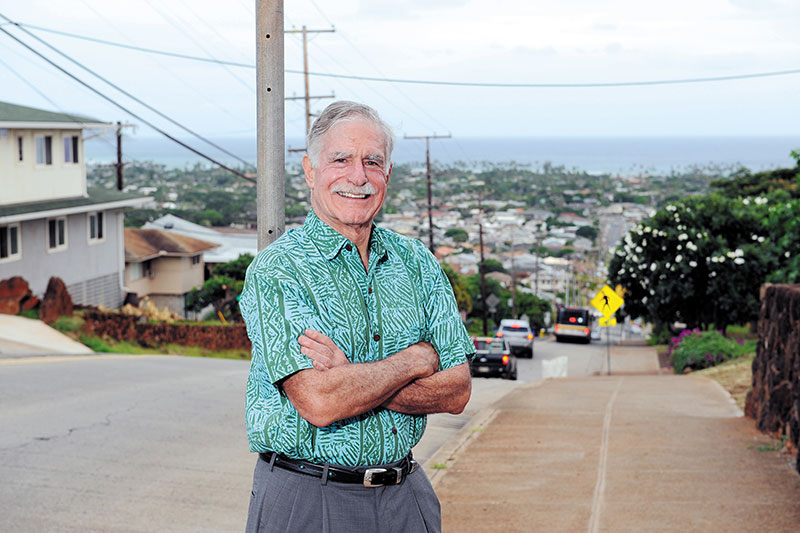
Rich Turbin has represented the Wai‘alae-Kahala communities since 1980.
He’s been serving his neighbors for nearly 40 years, yet Rich Turbin hasn’t lost his drive as a community watchdog and fighter for Wai‘alae-Kāhala Neighborhood Board.
Most of our neighbors don’t wear warm red sweaters like Mr. Rogers, do puppet shows or chat gently on camera with keiki. But do you really know what the people in your neighborhood are up to?
All over O‘ahu each month, hard working citizens spend long, hot weeknights sitting on hard chairs in echoing rooms to referee complaints and solve festering problems laid before them by their fellow residents at neighborhood board meetings.
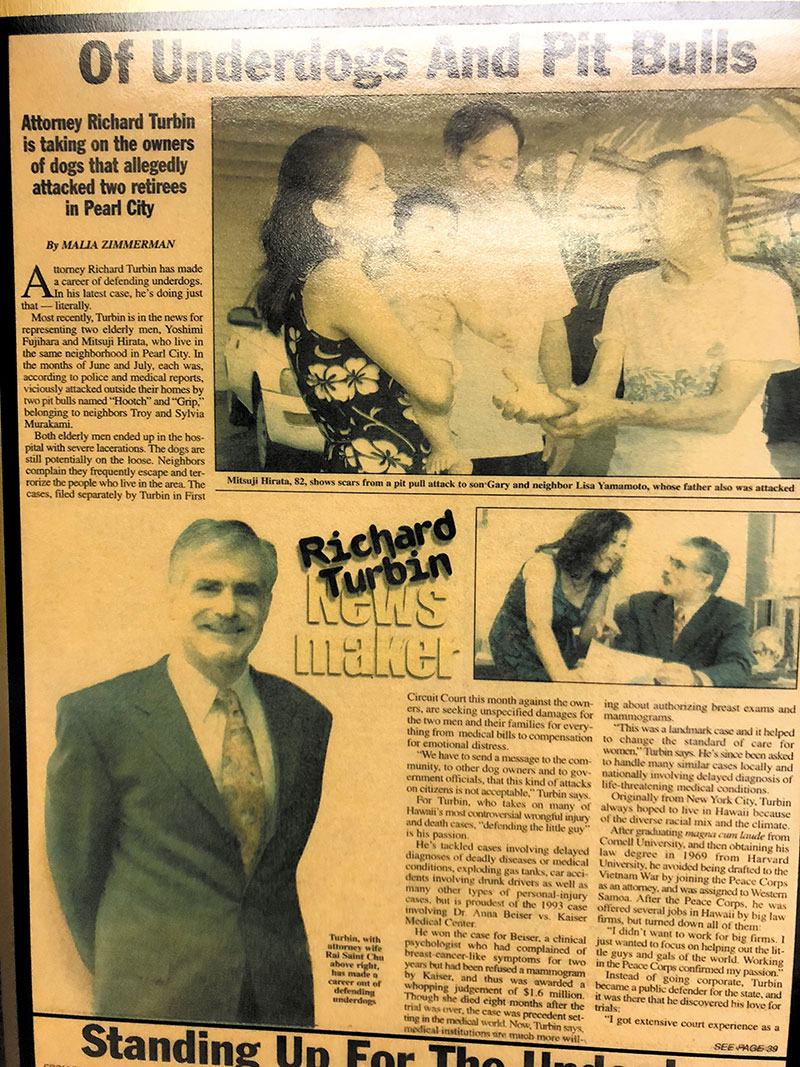
The attorney was featured as MidWeek’s Newsmaker on Aug. 22, 2001.
For decades now — and exclusive to our island — dedicated good guys referee heated debates over traffic, parking, liquor licenses, bulky item pickup, potholes, burglaries, speeders, homelessness, fires, car break-ins, bureaucrats, broken pipes, developers, trashed parks, building permits, helicopter noise and even a recent report of “little black frogs hopping around.”
Since the experimental citizen advisory boards were established in 1975 for Honolulu county, these heroes have heard it all. They are elected to monitor the goings-on of 33 designated communities — and they do it for free.
Or “pro bono,” as board veteran and attorney Rich Turbin calls it.
The Kāhala resident first joined Wai‘alae-Kāhala Neighborhood Board No. 3 following the 1980 board elections. He’s been at it now for nearly four decades, half of those years as chairman.
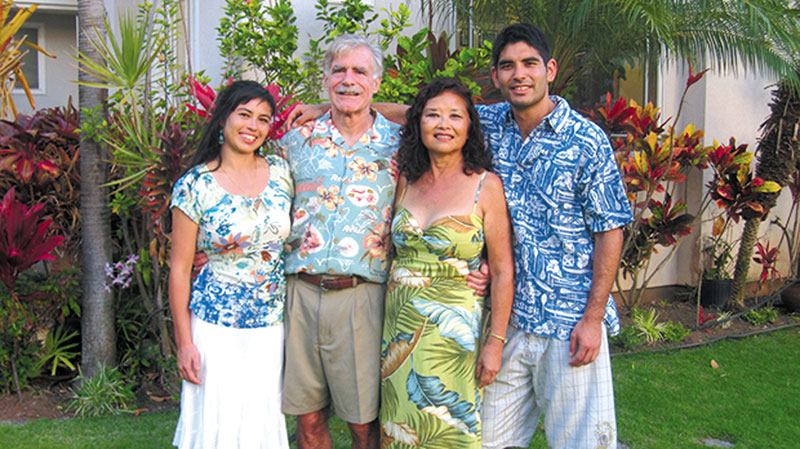
When not spending time with wife Rai Saint Chu and children Laurel Mei-Singh and Derek, Turbin is often actively participating in community causes (right top and bottom). PHOTOS COURTESY RICH TURBIN
“I really feel good about it. It’s fun for me, and I want to do a good job,” declares the husband and father of two adult children. “I’m a capitalist, not a socialist, and I enjoy helping the underdog. People need advocacy. They need a watchdog, a helper and protector, and we all need that spiritual uplifting — working for positive causes and solutions.
“A board chairman’s role,” he adds, “is to figure out the problem and find a practical solution as a social engineer, not a yeller and screamer.”
Turbin feels lucky to be working with thoughtful, collaborative colleagues, and he urges others to participate.
“It’s not that big a sacrifice — 10 meetings a year for two hours each, with a helpful staff (from the Neighborhood Commission).”
Held every other year by mail-in ballot, the next board elections will be in 2021. All Honolulu residents age 18 and older are eligible to run for a position in their district and can also vote for others to represent them on the issues. Details are available at honolulu.gov/nco.
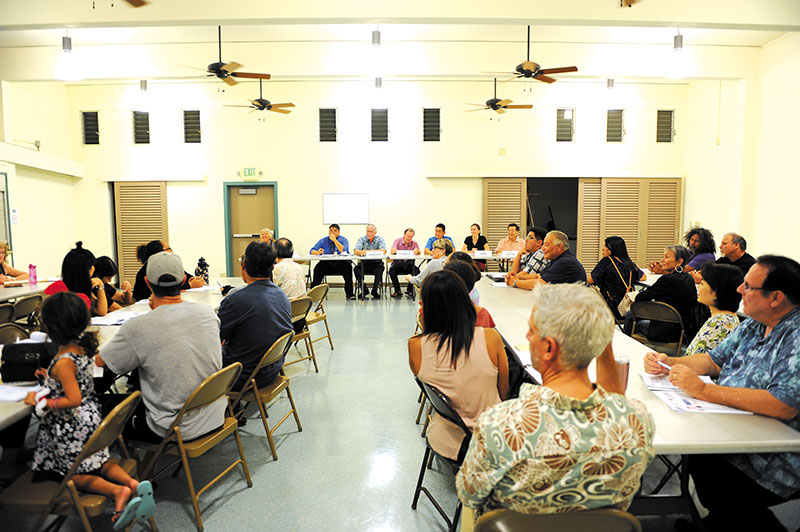
Turbin relishes the opportunity he has to service his East O‘ahu communities. “It’s not that big a sacrifice — 10 meetings a year, for two hours each with a helpful staff .” LAWRENCE TABUDLO PHOTOS
A New York City native who also speaks Samoan and French, Turbin says his was the only Jewish family in a tough immigrant neighborhood of Flushing, Queens. He survived public school bullies and fights for the underdog (“I have scars …”). He then went on to graduate in history magna cum laude from Cornell University in 1966 and from Harvard law school in 1969, with help from an IBEW scholarship. From there he traveled to Western Samoa, where he worked as a Peace Corps lawyer until settling here in Honolulu in 1971 to work as a deputy public defender.
“Friends with the Samoan rugby club were my first family here,” he recalls, chatting recently in the 27th-floor conference room of his law firm at Pacific Guardian Center. Among Turbin’s many awards — both professional and on the international front — he proudly lists Old Boy Player of 1995 for the Hawai‘i Harlequins Rugby Football Club.
Indeed, Wai‘alae-Kāhala’s gutsy decade-long campaign against Genshiro Kawamoto’s desecration of Kāhala Avenue properties may reflect some of Turbin’s fighting spirit on the rugby fields of Samoa and O‘ahu. The board’s role in that battle, he explains, was to “shine a bright light” on the problem and pressure the city to cite Kawamoto.
Board leaders are a varied bunch, from business owners and realtors to civil servants and military veterans, from professional planners and teachers to contractors and bowling alley operators. Many are retired, but that doesn’t stop them from attending extra meetings and hearings, as well as parades, sign-waving campaigns and other community events. In fact, a quick check of Neighborhood Commission records shows three dozen members with more than 20 years of unpaid service to their communities, and six of those have volunteered for more than 30 years.
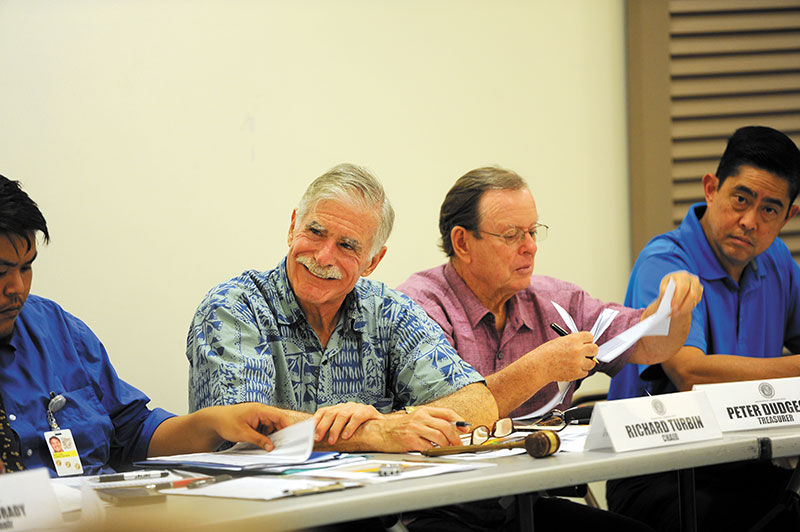
Not all neighborhood outcomes are as universally popular as the Kawamoto one, however. When Wai‘alae-Kāhala pressed for a law to cut back plants nurtured by homeowners near the public beach access, it upset the affected residents. And Turbin admits that his picketing campaign to add a second level to Kāhala Mall’s parking garage also lost him some friends — though it gained street parking space for residents.
Kāhala’s posh beachfront neighborhood, meanwhile, is now free of the disgraced Kawamoto’s bizarre plans, thanks to his tax evasion convictions in Japan, and a buy out of his Kāhala properties in 2014 by Alexander & Baldwin. There is plenty more to keep the Wai‘alae-Kāhala board busy, however.
Now the battles are to make Diamond Head Beach Park clean and safe — and keep it that way by forming a regular neighborhood patrol, to stop the next infestation of two-story beachfront monster homes, to slow down speeders on narrow residential streets, to save Cromwell’s surf site by Shangri-La, to continue to beautify local and highway corridors, and much more.
Pick your battles, and go for three of them per year, is a Turbin motto. “It’s doable,” he believes.
Sometimes you lose a few, such as the so-called inclinator, which is a private tram now being built on Diamond Head slope after the homeowner won a city permit for it.
“That one bugged me,” Turbin admits. “That ski lift is an ugly, terrible precedent.”
And sometimes you win, such as when The Kāhala Hotel & Resort pulled its request to expand use of public easements in 2017. Or years ago when the board succeeded in its campaign to get fencing installed around Kāhala Elementary School to shield keiki from speeding traffic.
The key is to have a good leader, according to Turbin’s wife and law partner Rai Saint Chu, who is a respected leader in her own right.
“I encouraged him to stay on the board,” she says, “because nobody else could be as on-point.
As a problem-solver, Rich summarizes each point and has a proposal and action plan before he leaves the subject.”
Though she doesn’t come to the board meetings, Turbin says Rai is a big help and gives good advice. Plus, “we run a good mom-and-pop shop together,” referring to their law firm. “We complement each other and agree on most things.”
Rich and Rai, who was born in Taiwan, first met when he worked in the Public Defender’s office in Kalihi.
“Rai came out to Hawai‘i as a Legal Aid/VISTA lawyer, and she was borrowing some snorkeling gear from a colleague. That’s the only time she went in the water,” he recalls, chuckling.
They married in 1976, and are proud of their son, Derek, an attorney now sub-leasing space in the offices of Turbin Chu Heidt, and daughter Laurel Mei-Singh, a University of Hawai‘i at Mānoa assistant professor of ethnic studies, specializing in environmental sustainability, justice and resilience.
Between board meetings this fall, the couple attended the 75th anniversary of the liberation of Bruyeres and Biffortaine in France, honoring the World War II heroics of the 442nd Regimental Combat Team and 100th Infantry Battalion. Turbin represented Hawai‘i’s Alliance Francaise there. He also has served on the East-West Center’s board of governors and was its chairman for three years.
He’s got a big neighborhood, all right.
Next on his agenda is to help start, organize and run a Neighborhood Security Watch for Diamond Head Beach Park (aka Diamond Head Cliffs) together with the Surfrider Foundation, Diamond Head-Kapahulu-St. Louis Heights Board No. 5 and other volunteers. The startup meeting is set for 6-7 p.m. Dec. 10 at Pākī Park Pavilion. The goal is to keep the park clean, safe and free of illegal campsites, which is a festering problem at that popular visitor site.
Lawmakers and paid city servants, such as police, firefighters and department heads also attend neighborhood board meetings to make announcements, explain things and follow up on complaints.
Armed with statistics and safety warnings, police officers often field the most questions from upset citizens. For example:
“He’s right there by the bridge. Why can’t you arrest him now?,” demands an extremely frustrated resident. Answer: “You can’t arrest someone for just sitting in his car, sir.”
Or, “Why don’t they haul away those illegally parked cars?” Answer: “Sometimes the tow truck doesn’t come because their own lot is full, ma’am.”
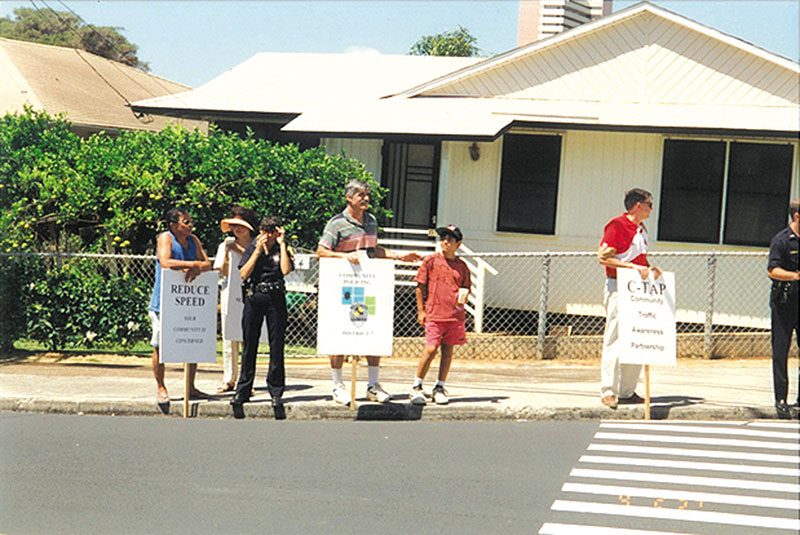
FOREVER YOUNG
Equally dedicated to their neighbors are folks like Sylvia Young. Still a full-time credit union professional, she joined the Nu‘uanu-Punchbowl Neighborhood Board No. 12 as a founding member in 1977.
“I remember seeing (City Councilman) Frank Loo on the street holding a sandwich board about a town hall meeting.”
As a lifelong Pauoa resident, she attended, and it immediately sparked her interest.
During her continuing 42-year tenure on the board, she also has spent 16 years as a member and/or leader of the Neighborhood Commission, which oversees the boards, gives advice, settles disputes and holds members accountable to their constituents.
“We once had 70-something cases, but we got it cleaned up — no more complaints,” Young recalls proudly, noting that the commission also developed a helpful book of guidelines for each board.
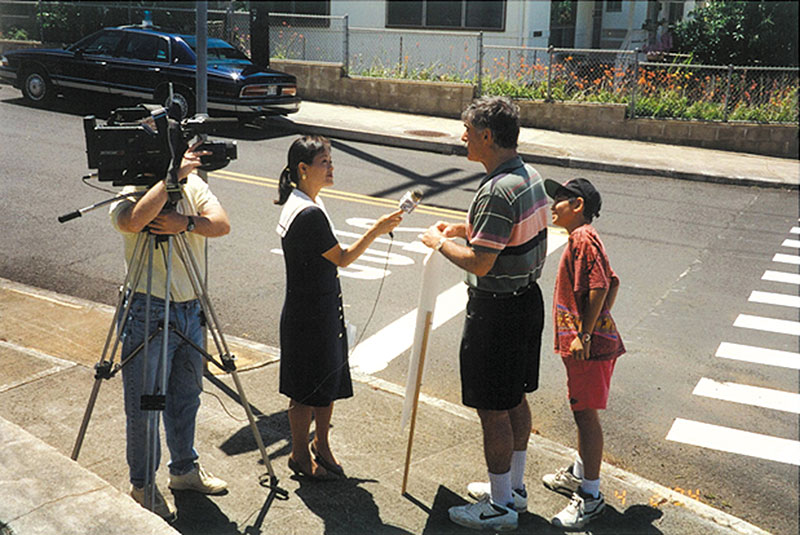
Sometimes this pistol of a grandma wishes she could spank a board or two, “so they’d get their act together,” and she wishes more young people would join. “Young people don’t know their roots or their history.” She’s also proud of other colleagues and officeholders who have come up through the board ranks.
“There are a lot of good people,” she says, citing longtime Waik°k° Neighborhood Board No. 9 chairman Robert Finley for his help and knowledge of land use issues. They’ve worked together on several projects.
Young’s family has lived in Pauoa for six generations, and her dedication is apparent.
“I love Pauoa, and I stay on to protect it,” she declares.
With grant funding, she and others even produced an historic video record of their neighborhood, The ‘~ina Remains which aired on PBS Hawai‘i. Featured highlights include the Pacific Heights tram, Kapena Falls, Pali Lookout, Queen Lili‘uokalani Gardens, the Portuguese Punchbowl community and more.
“There’s no better decision to make than working for your community.”





